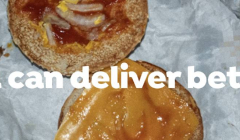
Knorr spotlights fast food fails to deliver better
The campaign from MullenLowe highlights that home made food can be better than takeaways.

Sporting competitions are prime territory for brands to build brand messaging around

Even the most disinterested would be hard-pressed not to find some moment in this summer of sport’s event calendar to catch their eye or get their hearts racing as elite athletes compete on the world stage. A summer that started with the Euros, moved on to the tennis courts of suburban London and is now firmly on French territory with the biggest event of all, the 2024 Olympic Games, soon to be followed by the Paralympic Games.
Sporting events on this scale remain among the last bastions of appointment to view where nations come together in a cultural moment. With the anticipation as vital as the competition, these global sporting competitions are prime territory for brands to build their messaging around. From loyal fans to those just along for the ride, wanting to be part of the hype – these are golden opportunities for brands to cut through, especially with important messages and purposeful work that connects with consumers on a profound level.
As we make our way through a summer of sport, we have seen how big sporting events have shifted from pure entertainment to contributors of social change and equity. And while international sporting events always draw the big money, smaller brands and campaigns are not precluded; they too can amplify their message by piggybacking the attention.
We have seen how big sporting events have shifted from pure entertainment to contributors of social change and equity.
Melissa Chapman, CEO, Jungle Creations & The Wild by Jungle
For every Nike maximising the moment – its Watch Where We’re Going work in partnership with the Olympic Refugee Committee promotes its purpose with goosebump-inducing clarity – there is the ‘No More Injury Time’ anti-domestic abuse campaign from the Euros. Less money, but no less impactful.
With the slogan “When we lose, she loses more”, The Wild by Jungle’s pro bono domestic abuse campaign launched ahead of the Euros in partnership with survivors Rehema Muthamia, a former Miss England, and influencer Flo Finch, supported by leading charities, Solace and the National Centre for Domestic Violence. The campaign revealed an alternative football kit featuring Shirt 38, representing the 38% rise in reported abuse cases when the England men’s team loose in a major tournament.
Not only did the campaign generate billions in readership and social impressions, but it also raised awareness of – and sparked widespread conversations about – the reality of domestic abuse.
Indeed, Women’s Aid also launched its ‘No More Years of Hurt’ campaign at the Euros, to similarly shine a light on domestic abuse at this time. If there is a hierarchy of purpose, domestic abuse sadly probably languishes near the bottom, but with the attention that the Euros garnered, these campaigns were able to gain headlines that are usually so difficult to achieve.
Purpose-led campaigns work around sporting events because rather than interrupting a conversation, they add to it. And by doing so, the work can avoid purpose fatigue that might otherwise exist, as well as tapping into an audience that is not always receptive at other times of the year.
The fact that we can write about these two domestic abuse awareness campaigns in the same article as global brands like Nike and EE – its “Hate. Not in My Shirt” creative tackled the issue of racism in football – shows just what a leveller sport can be for campaigns as well as competitors.
And now the Olympics is the current sporting platform offering brands a moment of purposeful power. Christian Aid has adopted the strategy of using this global stage to elevate its message and impact by using the buzz around the Olympics to highlight the climate crisis.
As an official partner, Samsung is ensuring that its top dollar sponsorship deal reaps the rewards – and the endless shots of athletes taking selfies with their Samsung flip phones suggests a thought-through strategy. But Samsung has also created transparent medals and a social media campaign around these – designed to celebrate ‘openness’ with athletes sharing their stories of overcoming challenges or past failures. It may be a less focused piece of purpose work, but it’s demonstrative of this approach nonetheless.
So, if there is often a false perception that activating around global sporting events is only for those with big budgets, established brand awareness and previous associations with sport, this summer should have put paid to that. The passions associated with sporting prowess mean emotional triggers are high and audiences are more receptive than ever to purposeful messages. By using key partners, real life spokespeople and making the most of owned channels – as well as drawing on the successes of other well-respected campaigns – all brands can use sport to drive change alongside their own brand awareness.
Melissa Chapman is Chief Executive Officer at Jungle Creations, setting the overall business vision, driving business growth and ensuring successful delivery of the business strategy. Melissa was previously Chief Content and Brand Officer at Jungle, where she was guardian of the company’s creative vision and was able to scale Jungle’s media brand audiences from 1 million followers to 140 million followers, launching new brands and new revenue streams in multiple territories. Melissa has been honoured by several prestigious industry bodies, including being featured in Ad Age’s Women to Watch, Management Today’s ‘35 Under 35 - Women in Business’, The Drum’s 50 Under 30, Talking Influence’s Influencer 50 and being named ‘Publishing Executive of the Year' at the Digiday Media Awards Europe. She also has a great fringe.
Looks like you need to create a Creativebrief account to perform this action.
Create account Sign inLooks like you need to create a Creativebrief account to perform this action.
Create account Sign in